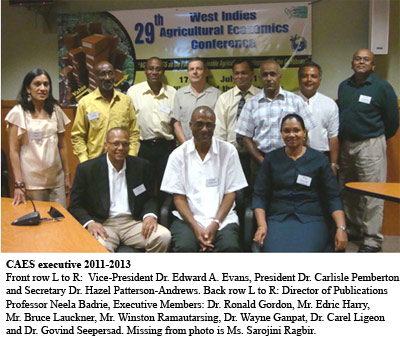|
September 2011

Issue Home >>
|
 Agribusiness as the path Agribusiness as the path
The 29th West Indies Agricultural Economics Conference was held for the first time in Kingstown, St. Vincent and the Grenadines on the 17th-21st July, 2011. This conference marked 45 years since the first Conference was held in 1966 at The UWI, St Augustine. The conference theme was on “Agribusiness as the Path to Sustainable Agricultural Development in the Caribbean” with subthemes of: Trade Policy, Agriculture in St. Vincent and the Grenadines, Rural Transformation and Agricultural Development Strategies and Synergies, Agricultural Production and Marketing, Value Chain Analysis and Agribusiness Development.
The Conference was declared open by the Acting Prime Minister, the Hon. Girlyn Miguel, who stressed the importance of agriculture to the economy of St Vincent and the Grenadines and supported the thrust of the Conference to promote agribusiness. She connected agriculture and rural development and suggested a greater role for The UWI in the solution of rural development challenges. She also highlighted the risks and challenges of agricultural production, saying that St Vincent and the Grenadines had suffered damages of $86.1 million in October 2010, with Hurricane Tomas.
The Lewis Beckford Memorial Lecture was given by Professor Curtis Jolly, Chair of the Department of Agricultural Economics and Rural Development, Auburn University, Alabama, USA, on “Can Agribusiness Sector serve as the Catalyst for Economic Development in Small Nation States? Myths and Realities.” He asserted that Caribbean countries should long have abandoned European trade preferences, as they did not promote sustainable development in the region because they were not based on indigenous knowledge and technology. He suggested that it may be difficult for agribusiness to make a serious contribution to the economies of the Caribbean, if the agricultural sector itself continues to decline. He recommended creative measures to increase innovation and exploit economies of scale and scope in small and medium scale agri-business enterprises, and specialize in the production and marketing of goods and services through the entry into emerging niche areas, such as organic foods and ethnic and heritage foods. Some of these new areas would require intensive use of human and physical capital, and the implementation of new ideas which can be facilitated by government policies which encourages microenterprise development.
|





